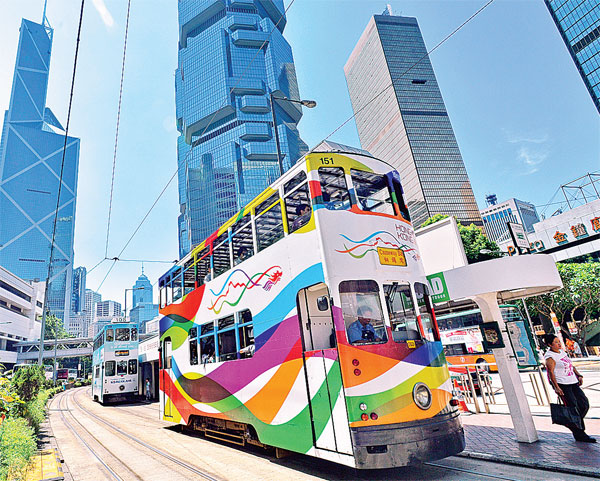SAR poised to be region's 'key growth engine', ideal venue for raising funds
Updated: 2017-07-02 14:35
By Sophie He in Hong Kong(HK Edition)
|
|||||||||
|
In this new era, Hong Kong companies can help in supervising overseas projects and promoting business models which have been a success in Hong Kong. Provided to China Daily |
How Hong Kong enterprises can jump on the bandwagon and grab the opportunities brought by the Belt and Road Initiative (B&R) is uppermost in their minds, says Choi Koon-shum, chairman of the Chinese General Chamber of Commerce (CGCC).
With the mammoth project in full swing, Hong Kong - an important foothold of the 21st Century Maritime Silk Road - is set to be a key driving force for promoting the city's and the region's economic development in the coming year by strengthening its ties with Guangdong province and the Association of Southeast Asian Nations (ASEAN). The SAR should also capitalize on its advantages as a global financial center and a magnet for initial public offerings (IPOs).
In Choi's view, many State-owned enterprises (SOEs) engaged in infrastructure are capable of taking on major projects, like building airports, railways and bridges in the countries and regions involved in the B&R project. Such a capability is beyond the reach of most Hong Kong companies.
But, Hong Kong does have a great modern services industry, he stresses, adding that the city is host to many of the big-name financial institutions, including those engaged in auditing, law and consultancy. Local companies should thus team up with SOEs in these infrastructure projects.
"Apart from offering professional services, Hong Kong companies can help in supervising overseas projects and apply our business models, like the MTR's 'Rail plus Property' business plan, which has been very successful in Hong Kong."
Hong Kong is also an ideal venue for raising funds. Mainland enterprises can list in Hong Kong and use their IPO funds to drive their projects abroad.
According to Choi, the CGCC joined the Belt & Road Industrial and Commercial Alliance last year. The alliance, launched by the China Federation of Industrial Economics, will help promote the B&R project to related countries this year and organize meetings to discuss ways of boosting communication and cooperation.
In addition, internationally-oriented B&R-themed forums are on the cards.
In Hong Kong, the CGCC will hold a summit on regional cooperation between Hong Kong and East Asia in July this year, bringing together ministerial-level and principal officials, business elite and scholars from Japan, South Korea, ASEAN member countries, as well Hong Kong and the Chinese mainland, to explore the latest economic trends in the region and Hong Kong's role.
The CGCC is also one of the organizers of the World Chinese Entrepreneurs Convention, which aims to help mainland entrepreneurs promote their businesses.
Choi says China's economy is embracing the "new normal" and is likely to see 6.5-percent GDP growth for 2017. He expects the US dollar to stay strong and the yuan to continue coming under depreciation pressure.
Although a strong greenback and a relatively weak renminbi will be a boon for exports, it will have a negative impact on Hong Kong's tourism business, he says. Introducing standard working hours or raising the statutory minimum wage would also hamper the city's business environment.
However, Hong Kong is well-augmented by a perfect legal system and low tax regime, while most Hong Kong companies operate beyond the local market, giving CGCC members much consolation for the future.
Sunwah Group was founded by Jonathan Choi's father Choi Ka-yau and has since grown into a multinational corporation with diversified interests in real estate, financial services, media and infrastructure.
"I'm from the second generation (in the company). My father started the business from scratch - from just a small company processing and distributing seafood," he tells China Daily.
Choi, who took over as chief executive of the company in 1982, studied literature at college in Japan. But, his father didn't like that, so he had to return to Hong Kong before he could finish his studies and started working in the fish market. He recalls having to get up at 4:30 each morning and working at the fish wholesale and distribution market from 5 am till very late, sometimes up to 11 pm.
After a few years, his family business expanded into real estate and the company started selling seafood globally. Sunwah Group subsequently took financial services, technology, media, infrastructure and education into its fold.
The diversified businesses provided the company with steady cash flow and allowed it to access some fast growing emerging industries, says Choi.
Choi says he does understand that young people in Hong Kong and on the Chinese mainland are very ambitious these days. Some of them aim to achieve great things academically, while others want to succeed in business.
"Whatever they want, they need to know that to realize their dreams, it won't be all smooth sailing. They'll have to work very hard and be able to ride out the tough times."
sophiehe@chinadailyhk.com
(HK Edition 07/02/2017 page15)
